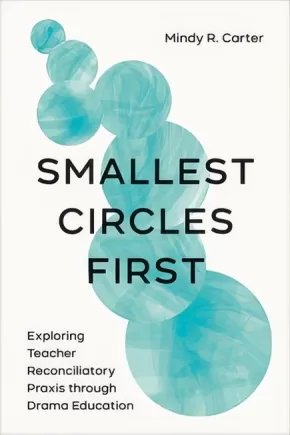Mindy R. Carter
Mindy R. Carter is an associate professor and the director of teacher education at McGill University.
Books (1)
Synopsis:
Drawing from studies with pre- and in-service teachers in Quebec, Smallest Circles First looks at how teacher agency engages with the educational calls to action from Canada’s Truth and Reconciliation Commission. Using drama education and theatre, Smallest Circles First explores how the classroom can be used as a liminal educational site to participate in reconciliatory praxis.
Smallest Circles First presents several arts-based educational research examples that illustrate how the arts provide a space for students, teachers, and communities to explore and learn about reconciliation praxis and responsibilities. By implementing arts-based counter-narratives set against settler Canadian history and geography, Smallest Circles First considers the implications of systemic racism, colonization, and political, social, and economic ramifications of governmental policies. Tangible examples from the book showcase how teachers and students can use the arts to learn specifically about their responsibilities in engaging with Canada’s Truth and Reconciliation Commission, in addition to how this work can still meet curricular learning outcomes.
Reviews
"A contribution to the fields of education and performing arts, Smallest Circles First is an excellent example of what can be done and what needs to be done in regards to building a shared future for all Canadians. Readers will feel empathic and identified with these narratives; not just the narratives of the author but also with the narratives of the participants in the research." — Maria del Carmen Rodriguez de France, Assistant Professor of Indigenous Education, University of Victoria
"The research and writing found in Smallest Circles First advances the calls to action in the TRC – in ways that allow space for exploration and in ways that do not insist that there is one ‘true’ way to do the work of reconciliation. This book is as much about hope as it is deep and instructive." — Michele Sorensen, Assistant Professor in the Faculty of Social Work, University of Regina
"Carter’s book provides insightful ways of engaging respectfully and meaningfully with Indigenous topics through drama-based approaches. She describes the work in a way that is thoughtful, ethical, and well grounded. The case studies in Smallest Circles First are diverse and dynamic, and they come together in ways that allow the reader to see the cohesive nature of the book." — George Belliveau, Professor and Head of Language and Literacy Education, University of British Columbia
"Smallest Circles First is a must for any artist or educator, providing research-based evidence of the role theatre can play in healing and reconciliation; her reframing of risk as the grounds for creative rupture is an important corrective to the risk-avoidant perspectives that dominate research and education." — Sheila Christie, Associate Professor of English and Drama, Cape Breton University
Educator Information
Table of Contents
Foreword by Tom Dearhouse
1.Starting with the Smallest Circles First
Teacher Agency, Canada’s Truth and Reconciliation Commission, and the Arts Curriculum
Language, Culture, and Religion in Quebec Education
Are the Arts the Answer?
Vignettes
About This Book
2. Walk a Mile in Someone Else’s Shoes: Situating Theories and Methods
Identity, Subjectivity, and Posthumanism
Arts-Based Educational Research (ABER)
Narrative Inquiry
Vignettes and Constant Comparison for Data Analysis
Making Sense of the Data, Saturation, and Validity
3. We Start Here: Narratives, Vignettes, and Analysis
Narratives
Monologue: I’m Still Canadian, Dad!
Appropriation and Embodiment
Centring Oneself within a Community of Practice
Discussion
4. Weaving Together Understandings across Vignettes
Theme 1: Risk and Learning as Rupture
Theme 2: Belonging
Theme 3: Counter-narratives
5. Full circle
Unfolding’s
Towards an Instructional Model for Belonging and Becoming by Learning through/with Drama
Learning Responsibilities
New Directions: Learning beyond the arts
Coming full Circle
Appendices
Appendix 1: Sing the Brave Song: This Isn’t Over!
Appendix 2: Reconciliation!
Appendix 3: Monologue: I’m Still Canadian, Dad!
Glossary
References
Additional Information
186 pages | 6.00" x 9.00" | Paperback






